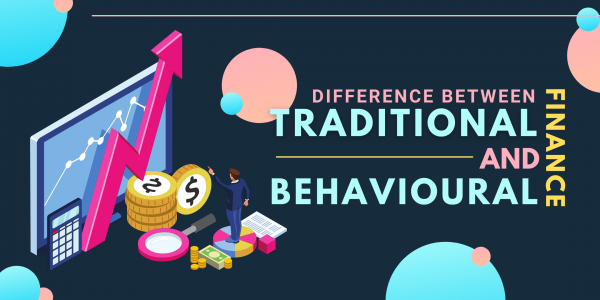Generally, people tend to categorize the word finance, this is because they have no idea that there are different types of finance and each type of finance has an influence over their decision to invest in stocks.
Read more about Finance
Among the vast types of finance, behaviorral finance and traditional finance are substantial aspects of finance, although, they both impact stocks, there are significant differences between them.
Making an investment decision is a bold and risky move that people make often, however, people are ignorant of the fact that most investment decisions are influenced by traditional and behavioral finance.
Economically, Behavioral Finance is an extension of Behavioral economics, which focuses on understanding various emotions of individuals/group and the judgment made to predict the growth of an economy & decisions.
Just as the name goes, Behavioral finance seeks to understand the behavior and rationality of an investor making financial decisions in the market, to help to avoid emotion-driven loss speculation.
Behavioral finance takes real world or feasible examples into account and states that people tend to make investment decisions emotionally rather than rationally. Furthermore, these emotions arise from long-term trust in the organization, friends’ advice, family’s advice, etc.
Meanwhile, in traditional finance, it is believed that investment decisions should be practical and based on mathematical calculations, economic models, market behavior, and other types of data rather than emotions. In other words, investors and consumers should be able to comprehend information and make decisions unbiased, allowing them to decide scrupulously.
Looking into the market, in traditional finance, the investor and the market are rational, because they gather or receive all the knowledge they have, and from that data and knowledge, they are able to make and support their decisions. Therefore, traditional finance states that investors don’t make financial decisions on emotions.
However, in behavioral finance, human psychology plays a huge role in how people make financial decisions or investments. This is because Behavioral finance explains that folks are irrational, and our own emotions and play a role in making investment decisions.
In Behavioral finance, Investment decisions are based on certain emotions such as fear, overconfidence, gut feeling, what others do, thereby, following the gang and past experiences.
On the contrary, traditional finance asserts that self-control causes the market to be perfect and efficient, while behavioral finance believes that emotions cause the market to be unpredictable and imperfect, resulting in market anomalies.
Sign up to the Connect Nigeria daily newsletter
Traditional finance believes that an investor may be a rational one that can process all information unbiased, while behavioral finance draws from real-world experience stating that an investor has biases, he is also irrational, and his emotions play a task within the modest investments undertaken.
Behavioral Finance has a lot to do with identifying and monitoring the normal pattern of the financial decision taken by a person, whereas Traditional Finance focuses on mathematical calculations, economic models & checking the market behavior.
Overtime, with the consistent use of traditional finances, investors have received unlimited knowledge, data, and knowledge that are perfect and accurate. On receiving this information, the investor carefully processes this information before making any decision, which clearly depicts that there’s complete rationality in his or her decisions.
However, in behavioral finance, investors have bounded rationality, because they do not process all information logically. Regardless of how accurate the knowledge is, investors are still sure to make a mistake in judgment.
As regards making assumptions, behavioral finance makes different assumptions about the behavior of an investor & market by observation, whereas traditional finance makes assumptions by considering the markets efficiently, with all available information that helps in taking decisions.
Traditional finance states that the market is efficient and may represent the financial market’s actual value, and this is because traditional finance believes that investors have self-control and can deal with their emotions while making investment decisions.
Traditional and behavioral finance differs eminently, because behavioral finance advocates emotional decision-making, while traditional finance advocates rational decision-making.
Nevertheless, traditional finance and behavioral finance have a great impact on individual decisions and the economy at large.
Traditional finance puts forth expectations for the market and its investors; whereas, behavioral finance puts reality forward.
Featured image source: D- Street Analyser
Got a suggestion? Contact us: [email protected]


